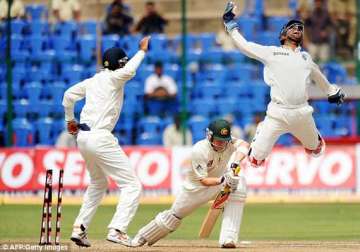Mumbai: Former all-rounder Ravi Shastri was of the opinion that tough battles against Australia in the early stages of an Indian cricketer's career have made them tough for stern Tests ahead.
The cricketer-turned-commentator also placed the intense on-field rivalry between India and Australia just a rung below that India-Pakistan duel.
He was speaking at a function here last evening organised by the Australian Trade Commission to elicit business around the 2015 Cricket World Cup which the country is co-hosting with Trans-Tasman neighbours New Zealand.
“I studied in English convent school so English manners were pretty good, but (I thought) enough of England. You wanted to get out to Australia perform in their zone, play hard, play fair and play to win and to do that you got to be hard yourself,” he said.
“One thing about Australia, they will hag you, give you enough on the cricket field, but if you can stand up and play and get runs there's mutual respect which helped me a lot right from my young age.
After that when you went on to play West Indies, went on to play the strongest teams with the best pace attack in the world you were not intimidated. You were up for a fight, you wanted to compete.
“You go and ask the young team of the ‘90s who really learnt how to fight and compete, the Gangulys, the Dravids, the Tendulkars. They were that era of players. It happened because of Australia,” said Shastri.
“India-Pak is the fabric, but outside that it's India-Australia (rivalry which brings out the) best cricket. The following that India-Aus cricket has is unmatched because of the competition, if you forget India-Pakistan that goes a long way back.”
Former Australia pacer Shaun Tait, who played for Rajasthan Royals in the IPL, agreed with Shastri and said the current lot of Indian players were not afraid of anyone, which may have been the case earlier.
“It might have been the case years ago. These guys started touring Australia and learnt to play different kind of cricket. Ravi talked about the Rahuls, Sachins and Souravs and when my turn came not a long time ago in playing them, the Indians were pretty tough,” Tait said.
Tait, who is to get married today to an Indian girl here, said the wickets and hot conditions made bowling fast on the benign tracks in this country and gave the example of Zaheer Khan when asked why India was not producing fast bowlers similar to him who was once clocked close to 160 kph.
“Australia are big people in general and we always had fast bowlers because of the size. These bowlers bowl on pretty flat wickets here in extremely hot conditions. It's not easy for fast bowlers to bowl in India especially for long periods of time.
“I had spoken to Zaheer Khan last night and he spoke to me about how he used to bowl at 150 kph in his younger age. Because he had to bowl so much on these wickets and conditions he got tired and had to rely on his line and length. The coaches are getting smarter in India and not bowling their guys into the ground here,” Tait said.
As an example of India-Australia connect in cricket, Rajasthan Royals CEO Raghu Iyer pointed out that one of the investors in his franchise was media baron Rupert Murdoch's son Lachlan.
“Rupert Murdoch's son Lachlan has invested in our company. I can also say about our recent tie up with Deakin University as sports education partner and interestingly it came up in one of the networking of Australian Trade Commission events. As Ravi stated, India-Australia connect is really big outside of India-Pak,” Iyer said.
